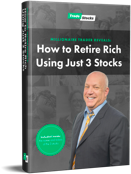
I’m 65, have $500,000 in cash, no ‘impressive’ work résumé and am terrified of investing — can I retire?
Hello,
I’ll turn 65 in December, and I’d LOVE to retire. First, the good news:
– I’m single and have no dependents (not even a pet).
– I own a home with no mortgage in a place I love that has low living expenses.
– I have zero debt.
– I have $475,000 in savings (almost all in cash at this point). I should have $500,000 by the end of the contract I’m currently working.
– I have a very modest lifestyle and am very frugal.
– I am in good health.
Now the bad news:
– Other than anticipated Social Security (approximately $1,300/month if I wait until full retirement age, $1,200/month if I retire at 65), I have no pension or other income streams.
– I don’t have an impressive work résumé that could lead to lucrative employment in retirement.
– I do not have a long-term care insurance policy.
– I have been a hapless investor for most of my life, and am terrified of investing in the markets in the current climate.
Will I ever be able to retire? Is there some way I can make $500,000 in savings last, especially given the abysmally low interest rate environment? Both my parents passed in their early 80s so that’s the best guess I have on my longevity.
I would be very interested in hearing your feedback. Thank you for your time.
Sincerely,
MD
See: There are six types of retirees — which are you?
Dear MD,
I’d like to start by congratulating you on the good news. Owning a home with no mortgage is a huge accomplishment, as is having no debt and nearly half a million dollars in savings. And, of course, it’s nice to hear you’re in good health!
There are a few parts of your letter I’d like to address. The first is regarding how much you have saved for retirement. While $500,000 is a lot of money — and as I said, a real achievement — it may not be enough for your retirement needs. You should first try to get a handle on what you expect to spend in retirement, as well as your anticipated cash flows, to see how much that leaves you with every month, according to James Guarino, managing director of advisory firm Baker Newman Noyes. It will also help you determine how much money you may need to earn to live comfortably in retirement, or what kind of lifestyle you can expect.
Here’s one way to go about this recommendation: Think about short-term and long-term needs, said Marguerita Cheng, chief executive officer of Blue Ocean Global Wealth. Consider the essential expenses you’ll have, such as utilities, groceries, any sort of health care, and then the variable expenses, like a museum membership or any dinners at a restaurant with family or friends. Then see if your Social Security benefits at full retirement age match that figure. “Because the reader is blessed with good health, it may make sense to delay until Full Retirement Age because Social Security provides inflation-adjusted guaranteed lifetime income,” she said.
Some advisers I heard from said you might even want to consider delaying Social Security until age 70, at which point you’d get your full benefit and then some. Your monthly benefit could be 32% higher, or more, if you waited until your 70th birthday, as MarketWatch columnist Mark Hulbert has explained. This way, you may also not become reliant on Social Security right now.
Don’t miss: Should I still use the 60/40 rule investing rule for retirement?
Investing can be scary, especially in the current environment. So much is unknown, and the markets naturally react to all of the chaos we are seeing in the world, what with the pandemic, looming city shutdowns, a heated election and so on. But investing can be one of the many keys to a successful retirement, and you could benefit from being a part of it. “Since he says he’s in good health, he could be around another 30 years and a plan keeping $500,000 in cash during that period is a wild bet,” said James Sexton, founder of Western Reserve Capital Management. The goal of investing money for people in your specific situation isn’t to become “rich” but to “accumulate the greatest level of assets so that they have more choices in retirement, and are not forced into an unpleasant situation,” he said.
Being a conservative investor can be challenging, Guarino said, and you may have to allocate a portion of your assets to more aggressive investments to get some extra income and protection against inflation (of which you would have practically none in most typical savings accounts).
There are also strategies, like the “bucket” strategy, that would put your money into different categories: short-term, for liquidity purposes, and long-term, for longevity, Cheng said. The former would focus on keeping your principal assets stable, while the latter would encourage the growth of that money. Longevity is a blessing, but it can also be a risk, as you need your money to last you your lifetime — one reason you should also look into long-term-care plans, which can give you a sense of calm should a health emergency arise one day.
Of course, if you are as terrified of investing as you say — and I’m sure many people would consider that reasonable — you should consider working with a financial adviser, if only periodically, to set you up with the proper investment portfolio and to occasionally do a check up. They could also suggest alternatives, such as an investment that would generate sustainable income (like a noncommissioned annuity, said David Haas, owner of Cereus Financial Advisors). To make the most of your assets, you could choose to work longer, live on less and take on some incremental risk, said Matt Bacon, a financial adviser at Carmichael Hill.
I’ll leave you with one more thought. You mentioned that you don’t have an impressive work résumé, but I believe if you have worked at all there’s something to say about it. If you do plan to work in retirement, if only part-time, think carefully about the type of job you’d like and how your current skills and past experiences can benefit you in that position. If you don’t have the proper education or experience for the role, are there any free or cheap online classes you can take to add to your résumé?
I recently responded to a woman who was 66, retired and now in need of a job to make ends meet. I’d like to reiterate what I told her: that it’s never too late. There are numerous opportunities out there that can help you supplement your retirement income, such as being a part of the gig economy (drivers, babysitters, dog walkers, freelance writers) or consulting in your field. If you’re crafty, you can make things to sell on platforms like Etsy. And if you’re looking for a more traditional role, you can set up job alerts on sites like Monster and Glassdoor, and take note of similar responsibilities and skills that companies ask for in job listings to include in your résumé or cover letter.
Good luck, and happy early birthday!
Have a question about your own retirement savings? Email us at HelpMeRetire@marketwatch.com

















